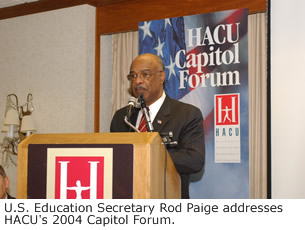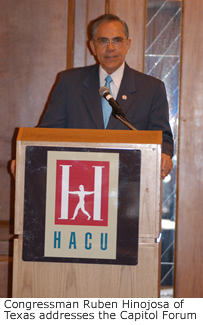For immediate release
HACU’s 2004 Capitol Forum focuses
on Hispanic higher education needs
WASHINGTON, D.C. – The leadership of the country’s Hispanic higher education community met on Capitol Hill this week to urge Congress to provide record new federal funding for the country’s fastest-growing student population.
“It was extraordinary to see so many diverse voices from throughout the country gather to present a unified voice for the education needs of our nation’s youngest and largest ethnic population,” said Antonio R. Flores, President and CEO of the Hispanic Association of Colleges and Universities (HACU).
“Our future economic success and security will depend on the investments Congress makes now in a population that already is having a dramatic impact in our schools, our communities and in every workplace,” Flores said following this week’s election-year HACU 2004 Capitol Forum on Hispanic Higher Education in Washington, D.C.
 The
Capitol Forum was sponsored by AT&T, Gateway, Miller Brewing Company, Freddie
Mac, The Coca-Cola Company and the Library of Congress. General Motors sponsored
HACU’s Summit on Diversity co-hosted by The George Washington University
on March 31.
The
Capitol Forum was sponsored by AT&T, Gateway, Miller Brewing Company, Freddie
Mac, The Coca-Cola Company and the Library of Congress. General Motors sponsored
HACU’s Summit on Diversity co-hosted by The George Washington University
on March 31.
U.S. Secretary of Education Rod Paige joined Flores at the Capitol Forum to sign a new partnership agreement that establishes the foundation to expand college and career opportunities for Hispanic students.
“We must open the door to postsecondary education for more Hispanic students and take steps to ensure that they have the skills, confidence and resources to complete their studies,” Secretary Paige said following the signing of a formal Memorandum of Understanding.
The new partnership agreement also promises to open doors to new research and educational capacity opportunities for the country’s Hispanic-Serving Institutions, or HSIs. HSIs serve the largest concentrations of Hispanic higher education students, but on average receive only about half the federal funding per student compared to all other institutions of higher learning.
Legislative agendas
HACU, which represents 360 member and partner colleges and universities in 26 states and Puerto Rico, presented Congress with a detailed Legislative Agenda calling for substantial increases in federal spending on HSIs, as well as “emerging HSIs” with rapidly growing Hispanic enrollment, for the upcoming federal Fiscal Year (FY) 2005.
HACU also called for a comprehensive series of long-range spending increases through the pending five-year reauthorization of the Higher Education Act (HEA). The HEA governs federal spending policies for all higher education institutions.
U.S. Senator John Cornyn of Texas praised the efforts of HSIs for training “the next generation of leaders” at their campuses.
“Hispanic Serving Institutions play an enormous role in educating the largest and fastest growing minority population in America,” Cornyn said. “These institutions may be the primary stakeholders in this area right now, but in the future, all of America will benefit from their success and the success of their students.”
Adam Chavarria, Executive Director of the White
House Initiative on Educational Excellence for Hispanic Americans, attracted
applause for pledging his continuing support for HACU’s mission to open
more doors to college for Hispanic students.
Continuing cutbacks in local and state support for the Hispanic higher education
community in an uncertain economy dominated most Capitol Forum sessions, as
higher education leaders described being forced to limit enrollment, eliminate
important classes and cut back or close campus services. Hispanics, who suffer
disproportionately high poverty rates, and other low-income minority populations
have been hit hardest, several presidents and chancellors said.
“Our Hispanic higher education community faces tremendous challenges,” said HACU Governing Board Chair Miguel Palacios, President of Pima Community College’s Desert Vista Campus in Arizona, in his welcome to Capitol Forum participants.
“Our outstanding member colleges and universities are at the forefront of every successful effort to serve our country’s fastest-growing and most under-served student population. Yet, many of these vital institutions are now struggling with substantial retrenchments in local, state and federal funding support,” Palacios said.
Increasing access
“Higher education is the cornerstone of democracy. Yet, in the world’s richest democracy, college is increasingly inaccessible to the poorer people in American society,” Florida’s Miami Dade College President Eduardo Padron said in a new report released at the Capitol Forum, “A Deficit of Understanding: Confronting the Funding Crisis in Higher Education and the Threat to Low-Income and Minority Access.”
U.S. Representative Robert Menendez of New Jersey, Chair of the House Democratic Caucus, said the economic well-being of the country cannot be sustained without major investments in higher education for all students.
“Education is the way in which we create wealth in this country,” said Menendez, the highest ranking Hispanic in Congressional history.
Challenges to the Hispanic higher education community will multiply with the coming surge of what Roberto Suro, Director of the influential Pew Hispanic Center, described as the “second generation” of Hispanic students approaching college age.
“This is a giant demographic wave headed toward your institutions,” Suro said, labeling those future students as a “strategic resource” for the country’s future.
“Your mission is not a Latino mission; it is an American mission,” Suro said, praising HSIs for the expertise they already boast in serving Hispanic higher education students. “It is incumbent on you to be sources of innovation and inspiration for all institutions of higher learning,” Suro said. “The future of the nation is in your hands.”
New U.S. Census Bureau projections show Hispanics by 2010 will number 47.8 million, said Jorge del Pinal, Assistant Division Chief for Special Populations Statistics in the Population Division of the U.S. Bureau of the Census.
Hispanics suffer the lowest high school and college graduation rates of any major population group. Pinal said 28 percent of Hispanics do not even have a ninth grade education.
Toward advanced degrees
Hispanics also earn less than 5 percent of all masters’ and doctoral degrees in high-demand fields such as teaching, engineering, science, medicine and technology.
 U.S.
Representative Ruben Hinojosa of Texas, Chair of the Education Task Force of
the Congressional Hispanic Caucus, attracted several rounds of applause from
Capitol Forum participants for describing his “Next Generation Hispanic-Serving
Institutions Act,” which attracted the bipartisan support of 110 members
of Congress for first-time funding for graduate education at HSIs.
U.S.
Representative Ruben Hinojosa of Texas, Chair of the Education Task Force of
the Congressional Hispanic Caucus, attracted several rounds of applause from
Capitol Forum participants for describing his “Next Generation Hispanic-Serving
Institutions Act,” which attracted the bipartisan support of 110 members
of Congress for first-time funding for graduate education at HSIs.
“Washington needs your voices,” Hinojosa said, urging participants to join him in persuading Congress to include graduate education funding in the five-year HEA reauthorization. “We cannot afford to wait another six years for the next reauthorization of the Higher Education Act to address the shortage of Hispanics with advanced degrees. The time is now,” Hinojosa said.
U.S. Representative Chris Van Hollen of Maryland pledged support for increasing student financial aid, which has negatively impacted students by shifting the burden from direct student aid such as Pell Grants to a greater share carried by more expensive student loans. “I support doubling the amount of the Pell Grant over the next five years,” Van Hollen said, to applause.
U.S. Senator Daniel Akaka of Hawaii, which is among the states experiencing surges in Hispanic population growth in the last decade, attracted applause and a pledge of support for his introduction of the College Literacy in Finance and Economics, or College LIFE Act.
U.S. Representative Randy Forbes of Virginia attracted applause and a pledge of support for his introduction of the Minority-Serving Institution Digital and Wireless Technology Opportunity Act, which would provide as much as $250 million a year in new technology support to HSIs and other minority-serving colleges and universities.
David Warren, President of the National Association of Independent Colleges and Association, praised his peers from HACU for hand-carrying HACU’s Legislative Agenda to the leadership of Congress during a day of visits to Capitol Hill as part of the Capitol Forum. “When we are right in our principles and organized in our practice, we can change the fundamental outcome of a vote,” Warren said.
For more information, contact HACU at (210)
692-3805. Ext. 3214. Or visit www.hacu.net.
